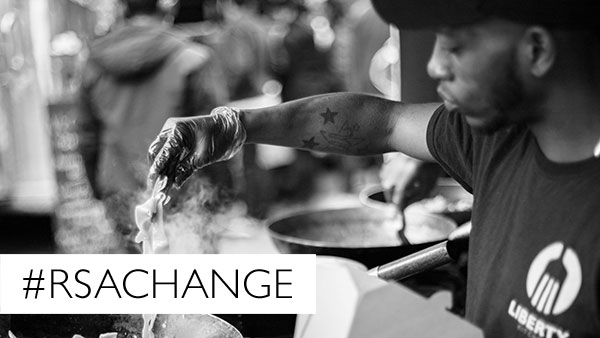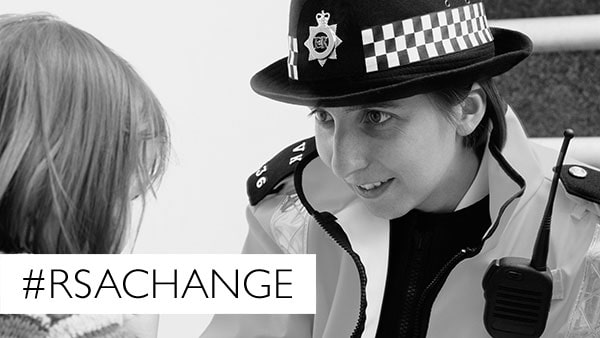Communities of colour in both the US and UK have been disproportionately impacted by Covid-19. This combined with the reaction to the police killings of George Floyd and Breonna Taylor in the US to mobilised Black Lives Matter protests around the world. Ash Prashar, RSA US Ambassador argues that these protests will continue and sets out some of the reforms to the criminal justice systems on both side of the Atlantic.
As the media and our Instagram feeds tire of the Black Lives Matter movement, it is depressing to see governments on both sides of the Atlantic try to brush over the root causes of the movement in favour of piecemeal offerings. The reality is, though, that the movement is not disappearing: it will not let up and will not be pacified by syrup rebrands or the removal of a couple of racist statues. In the UK as in the US, protests continue. Much of the media, just a few short weeks ago focusing on the incidents of violence rather than the majority of peaceful protests, has how ceased to report ongoing peaceful protests. That does not mean they are not happening.
Across the world, the streets are still filled with protesters, many risking their lives to oppose the police killings of George Floyd, Breonna Taylor and so many other Black people. But many in positions of authority believe this fight is simply an annoyance that can be put to bed by a few legal alterations. This ignorance is personified by political leaders who seem unaware of the longer history behind Black Lives Matter and ‘taking the knee’ but to not understood what is happening: people are demanding change and will not stop until it is secured. This is a movement of inclusion; it speaks with women and with the LGBTQIA community, uniting groups whose identity has led to their marginalisation under a cause that will extend from Black people to all of humanity. This inherent intersectionality enhances its power: it brings to account more than one form of marginalisation, by recognising the need to create systems not dominated by wealthier, white, male, straight men.
People have been forced to act. The United States houses 21% of the world’s prisoners, despite making up just 5% of its population, and Black people are incarcerated at more than five times the rate of white people. According to the NAACP, prison and jail populations would decline by almost 40% if Black and Hispanic people were incarcerated at the same rates as white people. Meanwhile in the UK, people from black, Asian and minority ethnic (BAME) backgrounds make up 14% of the general population, but 25% of the prison population in England and Wales and 41% of the youth justice system.
The US and UK have distinct histories and contexts. However, Covid-19 has disproportionately affected communities of colour in both the US and UK both in relation to health and economic impacts. Combined with longer-term anxiety about discrimination in the criminal justice system, the ineffective and punitive nature of prison, and police brutality in the US, this has highlighted the systemic and ingrained racism in society.
Communities of colour – in particular Black people – have faced the same oppressions for centuries. Black men in the UK still face discriminatory and false criminal charges, with police racially profiling people like bank manager Dale Semper who – like many others – had his life turned upside down, in this case simply for the crime of owning a nice car. Athlete Bianca Williams and her partner, Ricardo dos Santos were pulled over by UK police, with their baby in the car for ‘being on the wrong side of the road’ in a road with room for only a single car. According to the Lammy Review, published in 2017, more than half of the young people in prison in the UK are young people of colour. Yet, instead of finding ways to invest in the social infrastructure to support them, the British Prime Minister, Boris Johnson joins the list of UK leaders to decide that building more prisons is the answer.
The creation of these prisons is being touted as a way to ‘boost the economy’ through providing construction jobs. It is incredible that the UK is spending £2.5 billion on creating 10,000 additional prison places instead of social support and investment, when the UK already has the highest prison population in Europe.
Today’s protesters will not be browbeaten by an oppressive system. The UK’s education, housing and health-care systems have been hollowed out, but when we refuse to pay to have a safety net, we pay for not having one. In the UK, crimes committed by those with complex needs like mental health and substance abuse issues, and which call for social intervention, show a lower rate of reoffending when given a community sentence. The use of these has halved in the past decade. According to Ministry of Justice statistics published in 2013, 26% of women and 16% of men said they had received treatment for a mental health problem in the year before custody, but nearly one in five of those diagnosed with a mental health problem received no care from a mental health professional in prison. This alone is a compelling case for investment into social infrastructure.
In asking us to radically resist the racist violence at the very heart of policing structures and strategies, the Black Lives Matter movement recognised that we would have to move toward a more critical and more collective mode of justice for everyone. This means the demilitarisation of the police in the US, and the radical reimagination of ideas of justice on both sides of the pond through ending the fetishisation of punishment as a social cure-all.
This includes a renewal of the justice reinvestment movement, which started in the US and is gaining traction in certain regions but has not gained the traction in the UK that it needs to if we are to profoundly change where public resources are to be allocated. In both countries, there is an opportunity for significant nationwide expansion of alternatives to incarceration and detention, and impactful reform of the justice system. Here are three changes that could fundamentally redefine our criminal justice system: practicing restorative justice, implementing misdemeanor reform and passing legislation that would eliminate punishment for parole violations.
Punitive justice focuses primarily on punishments. Restorative justice focuses on the relationship between those who have committed a crime and the victim and centers the needs of survivors in ways that the traditional court system does not. Programs in the US based on this approach are being used right now in youth courts, such as New York’s Red Hook Community Justice Center and Harlem Community Justice Center, and by Impact Justice’s Restorative Justice Project, which aims to work in 10 major US cities. The work interrupts the cycle of offending, repairs harm caused to the victim and the community, and incorporates restorative healing circles.
Restorative justice programs have higher survivor satisfaction rates than punitive systems. Programs like Law Enforcement Assisted Diversion in Seattle are also important. The program partners civilians with local police to divert people involved in crime to the resources they need, without making an arrest.
Misdemeanors vary in severity from jaywalking to unpaid parking tickets and third-degree assault. While the latter may need stronger consequences, facing jail time for not being able to pay a speeding ticket or jaywalking isn’t just. What few Americans know is that misdemeanors make the US criminal justice system a profit center, making up 80% of state criminal dockets, putting throngs of people in US jails and prisons and millions of dollars for city and state governments. Misdemeanor should not be done away with, but our justice system must enforce appropriate consequences for offenses rather than disproportionate punishments.
Passing legislation that would eliminate parole violations would go a long way toward keeping people out of prisons and jails who don't belong there. New York City's Less is More Act is a great example of how to get that done. The act, if passed, would eliminate technical parole violations. The state's taxpayers spent millions of dollars last year incarcerating people for technical parole violations. New York would not be the first to take steps that eliminate parole violations. After South Carolina adopted sanctions – which included disciplinary actions outside of incarceration – violations decreased and recidivism dropped.
Committing to restorative justice, implementing these reforms and making other structural changes will significantly reform the justice system and ground it in the principle of care. It will set us on a path for that world without prisons.
Finally, the response to the pressure emanating from sustained protests against state violence has popular discourse rapidly shifting. Confederate monuments are being removed across America, although it is absurd that the US tolerates any confederacy celebration, given that this celebrates those that the US actually fought against. Slave-trader statues are being reviewed and taken down across London and other major cities. These mobilisations have succeeded in placing police violence and mass incarceration on the global agenda and are shaping political debate in the US and UK. They highlight the need to look at how popular notions of justice are shaped if we are to increase understanding based on the evidence.
The current system allows our leaders to ignore the police violence and the prison system the moment everybody stops shouting about it. It can seen as if the British police are more worried about arresting the activists who tore down the statue of slave-trader Edward Colston in Bristol than in enacting the change demanded by Black Lives Matter. The only option is constant protest; we are seeing a global movement that is only just beginning. This generation of activists will not stop protesting until we see an overhaul of our system. Some may call that a revolution.
Ashish Prashar is a justice reform campaigner, who sits on the Board of Exodus Transitional Community, Getting Out and Staying Out, Leap Confronting Conflict and the Responsible Business Initiative for Justice and is a fellow at the Royal Society of Arts.
Related articles
-
Cooking in custody
Iqbal Wahhab
Iqbal Wahhab outlines the ways food can make a real difference to prisoners’ lives
-
Liberty Kitchen – a social enterprise reshaping itself for the pandemic
Janet Boston FRSA
For two and a half years, Liberty Kitchen has been working with prisoners and those who have left to create tasty street food alongside providing a chance to change. Janet Boston shares how the social enterprise was impacted by and responded to the pandemic.
-
The evolution and future of ‘pavement-led’ solutions
Richard James FRSA
Richard James has been using the Intensive Engagement process to engage local people in issues around community safety, revealing the hidden voices, assets and networks in local communities. He sets out his ambitions and some new challenges for the future.




Be the first to write a comment
Comments
Please login to post a comment or reply
Don't have an account? Click here to register.